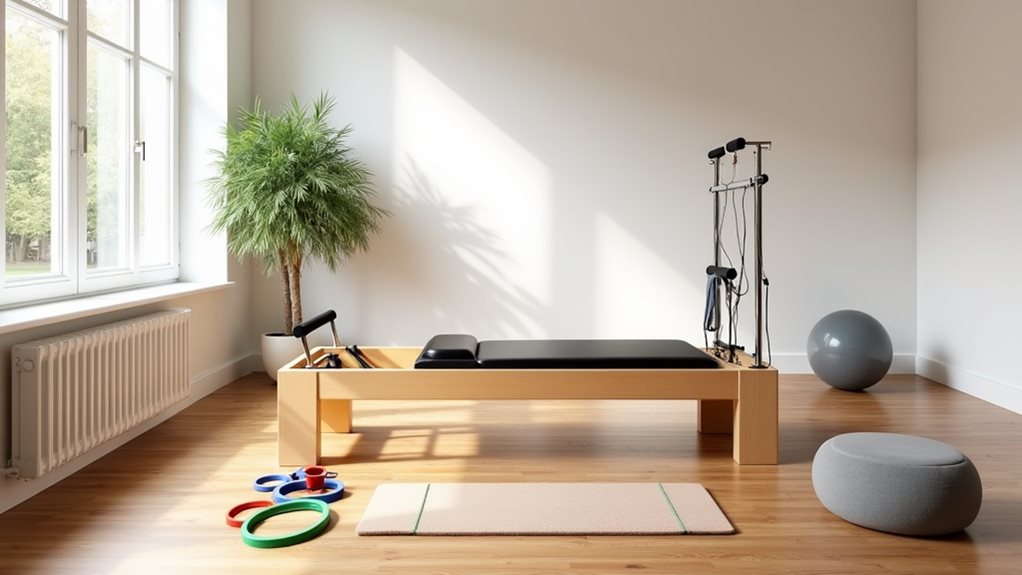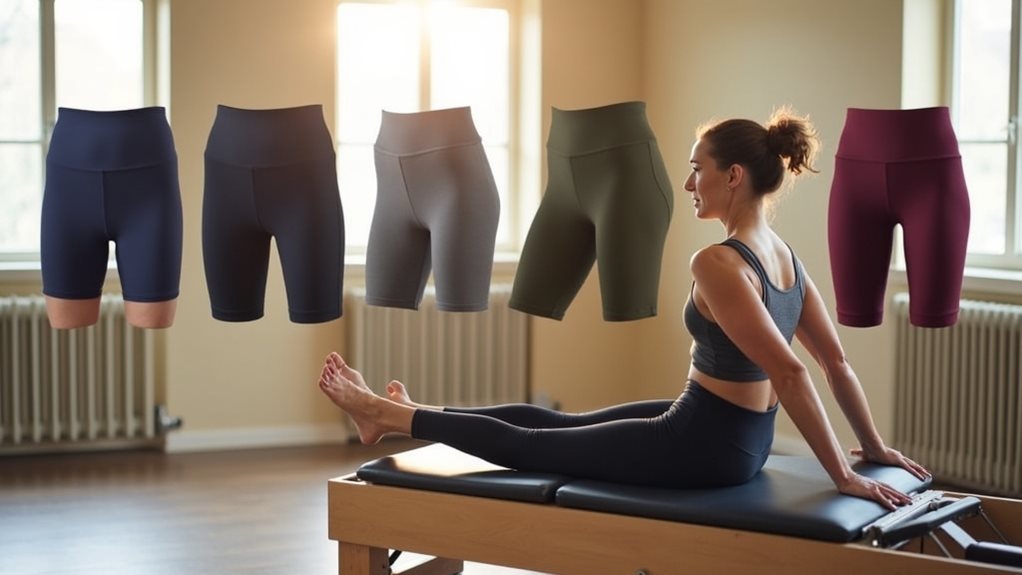When you start working out as a young person, it's important to remember that staying hydrated is key for improving your performance and recovery.
Make sure to drink enough water before, during, and after your workout to help your body handle the physical activity.
But that's just the start – there are other exercise tips you should know to get the most out of your fitness journey.
Let's go over some essential strategies to keep in mind for a successful and healthy workout routine.
Starting Slowly
When you're just starting out with exercise, it's important to take it slow. This approach helps you gradually increase your fitness levels while avoiding overwhelming yourself.
To begin your fitness journey, try adding a simple 10-minute walk to your daily routine. Doing this every other day can be less daunting for beginners and help you ease into a regular exercise routine.
As you get more comfortable, challenge yourself by adding an extra minute to your walks each time. This gradual increase will help improve your fitness level steadily without pushing yourself too hard.
Keeping track of your progress and rewarding yourself for reaching milestones can also be great motivators. You could even set up a contract with rewards for meeting your exercise goals to help you stay dedicated and inspired.
Screen Time Strategies
To help kids manage their screen time effectively, try out some strategies that encourage a good balance between using technology and staying active. It's a good idea to set limits on screen time, aiming for around 2 hours a day. This way, there's enough time left for physical activities.
Don't forget to remind them to take short breaks during screen time. This not only gives their eyes a rest but also lets them squeeze in some quick bursts of physical activity.
You can also make screen time more active by using fitness apps or following online workout videos.
It's important to keep an eye on how much time they spend on screens to ensure it fits in with their healthy habits and physical activity goals. By finding the right mix between screen time and being active, you're helping them stay healthy overall.
Enjoyable Workouts
Want to make your workouts more enjoyable and keep yourself motivated and active? The key is to find activities that you really like. Consider joining dance classes or outdoor clubs that interest you. You can even make chores fun by turning them into a way to move more during your day.
Check out local organizations that offer outdoor activities or try drama classes that involve physical activity. Remember, every little bit of movement counts, so finding ways to stay active throughout the day is important.
Making your exercise routine enjoyable is crucial for developing a lifelong love for staying active. By choosing activities that excite you and bring you joy, you'll be more likely to stay motivated and committed to your fitness goals.
Weight Training Benefits
Weight training exercises can do wonders for your physical fitness. They help in cutting down body fat and increasing muscle mass, making you stronger and more toned.
You can achieve these benefits by doing strength training activities like weightlifting, push-ups, and crunches. These exercises aren't only great for building muscles but also for improving overall health, especially for young individuals.
The best part about weight training is that you can do it at home without spending much or anything at all. Whether you opt for free weights, resistance bands, or just using your body weight, there are plenty of options for teenagers to get started with strength training.
However, it's crucial to consult a doctor before diving into any weight training routine to ensure it's safe and suitable for you.
Playing Sports
Playing sports is a great way to keep your body active and in good shape. Whether you like playing on a team or by yourself, sports offer a bunch of cool benefits for your body and mind.
When you play team sports, like basketball or soccer, you get to work with others and improve your coordination and teamwork skills. It's also a confidence booster because you get to see how your efforts contribute to the team's success.
On the other hand, individual sports, such as swimming or running, let you focus on your own performance and set personal goals. They can help you build discipline and resilience as you push yourself to improve and reach new milestones.
Sports for Fitness
Playing sports is a fun and effective way for young people to improve their fitness and feel great overall. When you join a sports team, you not only get to work out but also learn important skills like teamwork, communication, and discipline.
Being active in sports helps you stay healthy by boosting your heart health, strength, and coordination. And it's not just about physical benefits – playing sports can also make you feel better about yourself, more confident, and happier.
Benefits of Team Sports
Team sports are awesome for more than just staying in shape. They help you develop important life skills and create a strong sense of community among young people.
When you play team sports, you not only get fitter but also learn how to socialize, work as a team, and communicate effectively. These skills are super handy in all areas of life. Plus, being part of a team teaches you how to lead and solve problems, which are key skills for success.
Playing team sports regularly can really boost your overall health and well-being. It's not just about physical fitness; it's also about feeling connected and supported. Being part of a team gives you a sense of belonging and friendship, which can help reduce feelings of loneliness and improve your mental health.
And let's not forget about the confidence, self-esteem, and resilience that sports can build in you. These qualities will help you tackle challenges with a positive attitude.
Individual Vs Team Sports
When you think about getting into sports, deciding between individual and team sports can really shape how you grow and what skills you develop. Team sports like basketball or soccer are all about socializing, teamwork, and building strong bonds with your teammates. Playing team sports can make you more self-assured, improve your communication, and help you become a better leader as you work together towards shared goals.
On the flip side, individual sports such as swimming or tennis focus on independence, personal progress, and taking responsibility for your own performance. Taking part in individual sports gives you the freedom to set your own training schedule and concentrate on reaching your personal targets.
Both team and individual sports contribute to your physical health, mental well-being, and all-around skill enhancement. Whether you prefer team sports or individual sports, each type has its own advantages that can make a positive difference in your life and help you develop personally and athletically.
Exercise Recommendations
You should try to get in at least 1 hour of moderate to high-intensity exercise every day. This is what the CDC recommends for kids aged 6 to 17.
Meeting this guideline will help you get all the great benefits of being active and boost your overall health. By sticking to your exercise routine and trying out different techniques, you can start building a healthier future for yourself.
Benefits of Exercise
Exercise is super important for young people's health. It helps make your bones and muscles stronger and brings lots of health benefits.
Being active boosts your fitness, lowers the chances of heart disease and type 2 diabetes, and makes you feel good overall. To get all the perks, try to do 60 minutes of exercise every day like the US Department of Health and Human Services recommends.
It's also good to do muscle-strengthening activities at least 3 days a week and bone-strengthening exercises like jumping and running at least 3 days a week.
Effective Workout Techniques
Want to make the most out of your workouts and improve your health? Here are some key workout tips to help you reach your fitness goals:
Make sure to get in at least 60 minutes of moderate-to-vigorous physical activity every day to get the most health benefits. It could be anything from brisk walking to jogging or cycling.
Don't forget to include muscle-strengthening activities in your routine at least 3 days a week. This will help you build and maintain muscle mass, which is important for overall strength and metabolism.
Try to incorporate bone-strengthening exercises like jumping or running into your workout plan at least 3 days a week. This will help improve your bone density and overall bone health.
Importance of Consistency
Making physical activity a regular part of your day is key to getting the most out of exercise and improving your health overall. When you stay consistent with your workouts, you not only boost your fitness levels but also lower your chances of developing long-term health issues. Following the recommended daily exercise time frames is crucial for reaching your best health outcomes.
Setting up a consistent exercise schedule and sticking to it can lead to lasting improvements in how you feel physically and mentally. Meeting the daily exercise targets for young people can really make a big difference in your overall health and how good you feel.
Avoiding Overexertion
To avoid pushing yourself too hard during exercise, just pay attention to how your body feels and adjust your intensity as needed. Overdoing it can lead to injuries, lower immune function, and even mental health issues.
Here are a few important tips to help you steer clear of overexertion:
First off, keep an eye out for signs like feeling more anxious, changes in your body shape, pulling away from social activities, or developing eating issues. These could be red flags that you're pushing yourself too much.
Remember, your parents can be a big help in keeping an eye on your exercise level and giving you guidance. Don't be afraid to ask for their support.
And don't forget to give your body the rest it needs to recover. Balancing exercise with proper rest is crucial for preventing overexertion and staying healthy overall.
Ideal Exercise Types
To stay in top shape, it's important for young people to mix up their workouts with different types of exercises. Cardio exercises like running, swimming, or biking are great for boosting heart health and endurance.
Strength training activities such as push-ups and weightlifting help build muscles, rev up metabolism, and increase overall strength.
Don't forget bone-strengthening exercises like jumping and running, which are crucial for improving bone density and strength, especially as you get older for better bone health down the road.
Mixing cardio, strength training, and flexibility exercises in your routine ensures a well-rounded fitness plan that not only benefits your physical health but also boosts your mental well-being.
Special Considerations
Tailoring your workouts to fit your size and abilities is crucial when it comes to considering special factors for exercise as a young person. Here are some key points to keep in mind:
First and foremost, focus on putting in effort, building skills, and showing good sportsmanship rather than just on performance. This approach helps create a positive exercise experience.
Try not to get too caught up in how you look physically when you're working out. It's more important to develop a healthy relationship with exercise that isn't based solely on appearance.
Make sure to mix up your workouts to keep things fun and interesting. This variety can help prevent burnout and encourage you to stick with exercise in the long run.
As a young person, it's essential to prioritize your well-being and enjoyment when you're being active. Remember, your exercise habits can be influenced by different things, including the support and encouragement you get from those around you.
Parents, for example, can have a big impact on your fitness journey by providing emotional support. By keeping these special considerations in mind, you can develop a balanced approach to exercise that benefits both your physical and emotional health.
Conclusion
Now that you've picked up some important exercise tips for young people, remember to take it easy at the start and slowly increase your physical activity to avoid pushing yourself too hard.
Surprisingly, only about 21.6% of kids and teens between 6-19 years old are meeting the recommended physical activity levels for their age group.
To stay on track, try to make your workouts enjoyable, set achievable goals, and focus on your overall health and wellness.
Keep moving, stay motivated, and you'll be able to enjoy a healthy and active lifestyle for years to come!




